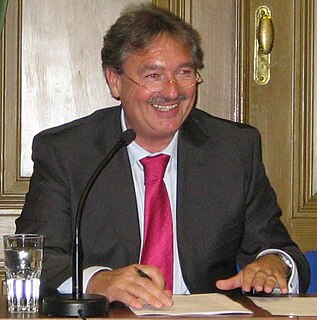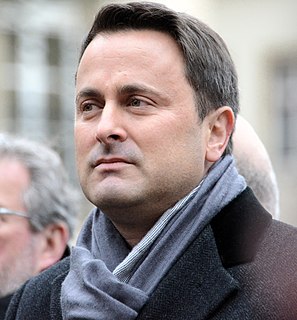
The Christian Social People's Party, abbreviated to CSV or PCS, is the largest political party in Luxembourg. The party follows a Christian-democratic ideology and, like most parties in Luxembourg, is strongly pro-European. The CSV is a member of the European People's Party (EPP) and the Centrist Democrat International (CDI).

General elections were held in Luxembourg on 13 June 2004, alongside European Parliament elections. The ruling Christian Social People's Party (CSV) of Prime Minister Jean-Claude Juncker won the election, increasing its number of seats to its highest since before 1989 and its share of the vote to levels not seen since the 1959 election.
Elections in Luxembourg are held to determine the political composition of the representative institutions of the Grand Duchy of Luxembourg. Luxembourg is a liberal representative democracy, with universal suffrage guaranteed under the constitution. Elections are held regularly, and are considered to be fair and free.

General elections were held in Luxembourg on 13 June 1999, alongside European Parliament elections. The Christian Social People's Party remained the largest party, winning 19 of the 60 seats in the Chamber of Deputies. It formed a coalition government with the Democratic Party.

General elections were held in Luxembourg on 12 June 1994, alongside European Parliament elections. The Christian Social People's Party remained the largest party, winning 21 of the 60 seats in the Chamber of Deputies. It continued the coalition government with the Luxembourg Socialist Workers' Party.

Claude Meisch is a Luxembourgish politician holding (?) a degree in financial mathematics from Trier university. Meisch was appointed Minister of Education in 2013 in the government of Xavier Bettel. He has been a member of the Chamber of Deputies since 1999 and Mayor of Differdange since 2002. He was President of the Democratic Party (DP) from 2004 until 2013, of which he has been a member since 1994.

The European Parliament election of 2009 in Luxembourg was the election of the delegation from Luxembourg to the European Parliament in 2009. It was held on the same day as the elections to the national legislature, the Chamber of Deputies.

General elections were held in Luxembourg on 7 June 2009, together with the 2009 election to the European Parliament. All sixty members of the Chamber of Deputies were elected for five years. The polls were topped by the Christian Social People's Party, which built upon its already high number of seats to achieve a commanding victory, with the highest vote share and number of seats of any party since 1954. Incumbent Prime Minister Jean-Claude Juncker, who is longest serving head of government in the European Union, renewed the coalition agreement with Deputy Prime Minister and Luxembourg Socialist Workers' Party leader Jean Asselborn and formed the Juncker-Asselborn Ministry II, which was sworn-in on 23 July 2009.

Xavier Bettel is a Luxembourgish politician and lawyer, serving as the 22nd Prime Minister of Luxembourg since 4 December 2013 after succeeding Jean-Claude Juncker. He has previously served as Mayor of Luxembourg City, member of the Chamber of Deputies and member of the Luxembourg City communal council. Bettel is a member of the Democratic Party. Following the 2018 Luxembourg general election he became the first openly gay Prime Minister in the world to be re-elected for a second term.

François Bausch is a Luxembourgish politician. He is a member of the Chamber of Deputies and communal council, and an échevin, of Luxembourg City. He is leader of the Greens in the Chamber.

Juncker–Asselborn Ministry II was the government of Luxembourg between 23 July 2009 and 11 July 2013. It was led by, and named after, Prime Minister Jean-Claude Juncker and Deputy Prime Minister Jean Asselborn. It was formed on 23 July 2009, after the 2009 election to the Chamber of Deputies. It fell after the withdrawal of the Luxembourg Socialist Workers' Party from the government; Prime Minister Juncker submitted his resignation to the Grand Duke on 11 July 2013, and a snap election was called.
Jean Colombera is a politician and physician in Luxembourg. He currently sits as a member of the Chamber of Deputies for the Alternative Democratic Reform Party, representing the Nord constituency.

Early general elections were held in Luxembourg on 20 October 2013. The elections were called after Prime Minister Jean-Claude Juncker, at the time the longest serving head of government in the European Union, announced his resignation over a spy scandal involving the Service de Renseignement de l'Etat (SREL). The review found Juncker deficient in his control over the service.

Etienne Schneider is a Luxembourg politician and economist of the Luxembourg Socialist Workers' Party (LSAP). He was a municipal councillor in Kayl from 1995 to 2005, and from 1997 to 2004, he was secretary general of the parliamentary group of the LSAP in Parliament. He was elected first alderman of the municipality of Kayl in 2005, a mandate he held until May 2010. Schneider was appointed Minister of the Economy and Foreign Trade on 1 February 2012. In the government formed following the 2013 Luxembourg general election he is Deputy Prime Minister and Minister of the Economy. He continued to hold these offices following the 2018 Luxembourg general election, where he became the health minister too. From 2013 to 2018, he served as Minister for Defence. Following the 2018 Luxembourg general election, he became the first openly gay politician to be reelected for the office of deputy minister.

The First Bettel–Schneider Ministry was the ruling government of Luxembourg from 4 December 2013 to 5 December 2018. It was led by Prime Minister Xavier Bettel and Deputy Prime Minister Étienne Schneider. It was formed on 4 December 2013, after the 2013 election to the Chamber of Deputies. The government wa a traffic light coalition between the Democratic Party (DP), the Luxembourg Socialist Workers' Party (LSAP), and The Greens. It was succeeded by Bettel–Schneider Ministry II in December 2018.
The 2017 Luxembourg communal elections were held on 8 October to elect the communal councils of the 102 municipalities of Luxembourg.
The Second Bettel–Schneider Ministry is the current government of Luxembourg. It is led by Prime Minister Xavier Bettel and Co-Deputy Prime Ministers Étienne Schneider and Félix Braz. It was formed on 5 December 2018, after the 2018 election to the Chamber of Deputies. The government is a continuation of the traffic light coalition between the Democratic Party (DP), the Luxembourg Socialist Workers' Party (LSAP), and The Greens from the First Bettel–Schneider Ministry, with minor changes.






















